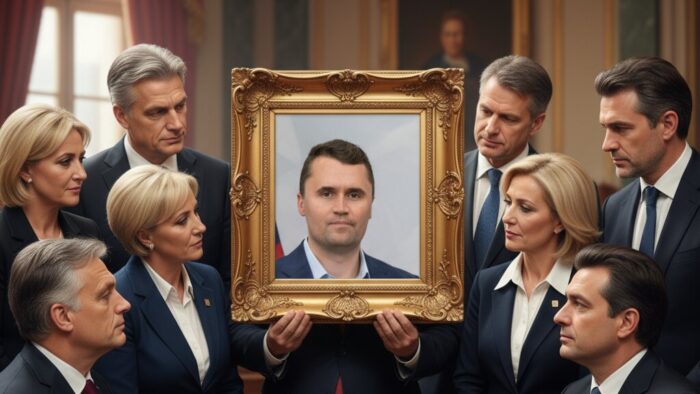Andrej Babiš, the billionaire populist leader whose ANO movement claimed its most significant election victory since its foundation in 2011, is steering the Czech Republic (Czechia) toward a pro-Russian path and threatening to abandon the country’s staunch support for Ukraine. On 5 October 2025, PBS NewsHour reported that the 71-year-old former Communist Party member, who has drawn comparisons to U.S. President Donald Trump, described the victory as the culmination of his political career. The article begins:
Four years ago, it seemed that the days in politics of billionaire Andrej Babiš were numbered. The ANO movement Babiš created (an abbreviation of Action of Dissatisfied Citizens that means “Yes” in Czech) to counter mainstream political parties was defeated in October 2021 by a coalition of pro-Western groups. The populist leader was expected to make good on his promise to quit, rather than end up in opposition. Instead, he immediately launched an aggressive campaign blaming the ruling coalition for every problem, from the energy crisis to soaring inflation. He promised to revoke a much-resented increase in the state pension age and to end help for Ukraine, while ridiculing Prime Minister Petr Fiala for being a better prime minister of Ukraine than of Czechia. On Saturday, ANO claimed its greatest election victory since its foundation in 2011.
ANO (Action of Dissatisfied Citizens) is a Czech centrist-populist movement founded in 2011 by billionaire Andrej Babiš, initially positioned as an anti-corruption and technocratic alternative to the Czech political establishment. Over time, the party’s stance has shifted toward nationalist populism, characterized by anti-elite and Eurosceptic rhetoric, as well as a growing alignment with right-wing narratives.
Read more here.
Key Points
- Babiš’s victory deprives Ukraine of a staunch supporter and is expected to join the ranks of Viktor Orbán of Hungary and Robert Fico of Slovakia, whose countries refuse to provide military aid to Ukraine.
- The populist leader said he was planning to abandon an internationally recognized Czech initiative that acquires artillery shells for Ukraine on markets outside the EU and opposes NATO’s commitment to increase defense spending significantly.
- Babiš has already joined forces with Viktor Orbán to create a new alliance in the European Parliament, called Patriots for Europe, which represents hard-right groups critical of EU migration and climate policies.
- Without a majority in the lower house, Babiš’s minority Cabinet would need tacit support from the Freedom and Direct Democracy anti-migrant party and the right-wing Motorists for Themselves to win a mandatory parliamentary confidence vote.
The Global National Conservative Alliance’s Expansion Across Eastern Europe: Hungary, Romania, and Bulgaria
Hungary serves as the operational center for an ideological coalition uniting right-wing and far-right movements worldwide under shared principles of national sovereignty, cultural identity, and opposition to global institutions. Budapest hosts annual CPAC conferences that bring together American conservatives with figures from across Europe, including former Czech Prime Minister Andrej Babiš and former Slovenian Prime Minister Janez Janša, described as “known for embracing conspiracy theories.” Hungarian Prime Minister Viktor Orbán has positioned his nation as the model for illiberal governance, delivering speeches where he likened liberalism to a “virus” threatening traditional society while urging far-right activists to “play by our own rules.” The network’s infrastructure extends through educational institutions that disseminate culture war themes aligned with Russian influence operations, with facilities reaching beyond Hungary’s borders into neighboring countries.
Romania’s national conservative movement surged dramatically through the surprising emergence of the Alliance for the Union of Romanians, transforming from obscurity in 2020 to become the nation’s second-largest party by 2024. AUR leader George Simion embodies MAGA-style politics, promoting what political analysts describe as “anti-science, Christian fundamentalism, and sovereignism” while building campaigns around unification with Moldova and opposition to globalist elites. According to Foreign Policy, “Simion shares much in common with Hungary’s Viktor Orban and Slovakia’s Robert Fico,” representing a broader pattern of nationalist politics spreading across the region. Western academics supporting rightwing culture war themes have appeared at Mathias Corvinus Collegium facilities in Cluj-Napoca, where Romanian students claim a “big wave” rejecting the United States and moving toward Russia because of “wokism America is exporting to Romania.”
Bulgaria mirrors these patterns, with pro-Russian parties, including the far-right Revival movement, securing approximately 15% of votes in the 2022 elections. Revival leader Kostadin Kostadinov openly demands Bulgaria exit the EU and NATO while invoking the threat of “globalism.” According to CEPA, Revival passed legislation banning LGBT “propaganda” in schools that is “nearly identical to Russian and Hungarian anti-LGBT+ propaganda laws,” while Bloomberg reports the party signed a cooperation agreement with Putin’s United Russia party in April 2025, “deepening anti-establishment ties with Moscow.”
These coordinated strategies—combining anti-LBGTQ legislation, attacks on civil society, and Russian alignment—reveal what represents a broader rightward shift across European politics, with National Conservatism Conferences strengthening transnational ties between Eastern European movements and American conservatives embracing illiberal governance as a template.
External References:
— George Simion Is Part of Romania’s Very Strange Far Right—and Soon Could Be Its President
— The Creeping Putinization of Bulgaria
— Hungary inspires U.S. conservatives. Its leader is seen as running a ‘dictatorship’
Disclaimer:
The Global Influence Operations Report (GIOR) utilizes AI throughout the posting process, including the generation of summaries for news items, introductions, key points, and, often, the “context” section. We recommend verifying all information before use. Additionally, all images are generated using AI and are intended solely for illustrative purposes. While they represent the events or individuals discussed, they should not be interpreted as real-world photography.










